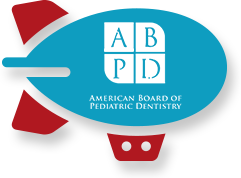September 29th, 2021
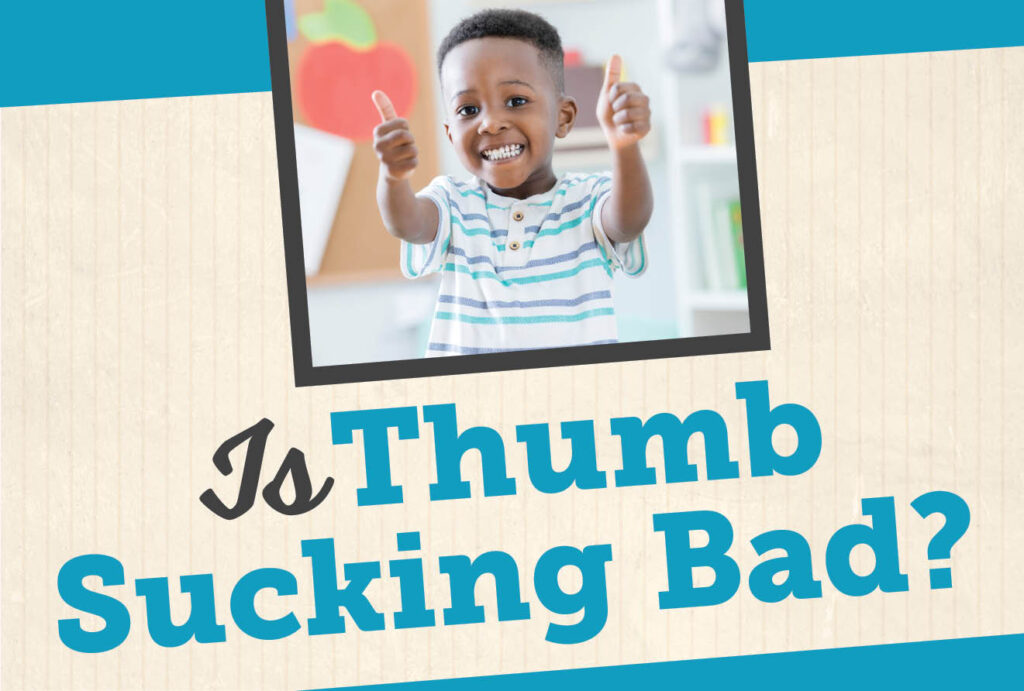
Is Thumb Sucking Bad?
Sucking is a natural reflex. Infants and young children may use thumbs, fingers, pacifiers, and other objects on which to suck. It may make them feel secure and happy or provide a sense of security during difficult periods. Since thumb-sucking is relaxing, it may induce sleep.
Most thumb-sucking that persists for long periods of time can cause problems with the proper growth of the mouth and tooth alignment. How intensely a child sucks on fingers or thumbs will determine whether or not dental problems may result. Children who rest their thumbs passively in their mouths are less likely to have difficulty than those who vigorously suck their thumbs.
Usually, children stop between the ages of two and four. Sometimes, peer pressure causes many school-aged children to stop. Children should try to stop thumb-sucking by about age three to prevent flaring of their permanent teeth.
Pacifiers are no substitute for thumb-sucking. They can affect the teeth essentially the same way as sucking fingers and thumbs. However, use of the pacifier can be controlled and modified more easily than the thumb or finger habit. If you have concerns about thumb sucking or use of a pacifier, consult with your pediatric dentist.
A few suggestions to help your child get through thumb sucking:
- Children often suck their thumbs when feeling insecure. Focus on correcting the cause of anxiety, instead of the thumb-sucking.
- Reward children when they refrain from sucking during difficult periods, such as when being separated from their parents.
- Your pediatric dentist can encourage children to stop sucking and explain what could happen if they continue.
- Consider using a sticker chart, or one of our coloring sheets to help encourage cessation of the habit.
- If these approaches don’t work, remind the children of their habit by bandaging the thumb or putting a sock on the hand at night. Sometimes, your pediatric dentist may recommend the use of a mouth appliance.
Visit our blog for more tips on how to help your child beat thumb-sucking and pacifiers.
August 23rd, 2021
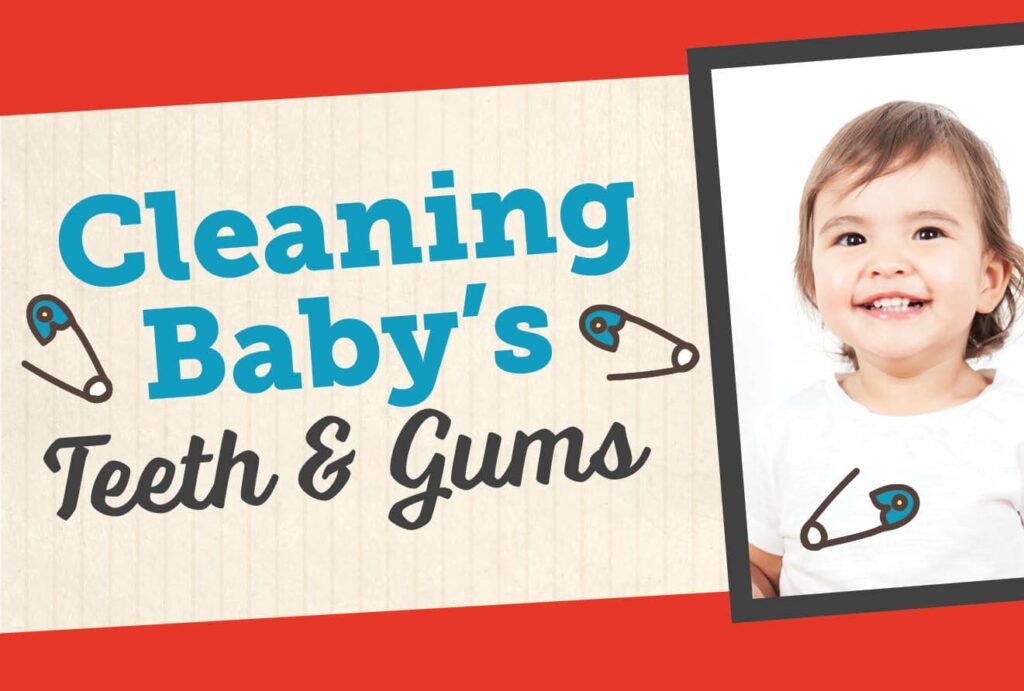
Did you know that good oral hygiene begins early? Even before your baby’s first tooth appears, the gums can benefit from your careful attention.
Caring for Gums
After breast- or bottle-feeding, wrap one finger with a clean, damp washcloth or piece of gauze and gently rub it across your baby’s gum tissue. This practice both clears your little one’s mouth of any fragments of food and begins the process for building good daily oral care habits. As your baby continues to grow, consider carefully what you put in your child's bottle or sippy cup especially at bed time.
Baby’s First Tooth
When that first tooth makes an entrance, it’s time to upgrade to a baby toothbrush. There are usually two options: a long-handled toothbrush that you and your baby can hold at the same time, and a finger-puppet-like brush that fits over the tip of your pointer finger. In each case, the bristles are soft and few. Regularly cleaning baby's teeth helps establish this habit from an early age.
Under age three, we recommend using a grain of rice sized amount of fluoride toothpaste. During the teething process, your child will want to chew on just about anything, and a baby toothbrush with a teether can become a favorite toy during this period.
Proper oral hygiene begins early and works great when parents make cleaning baby’s teeth a daily part of their routine from early on. These tips should help your child should build the habits that make a grand slam smile!
Tags: Dental Care, Preventing Cavities, Baby Teeth, Oral Care, Cavities, Cavity Prevention, Oral Health, Infant Oral Care, Pediatric Dentistry, Pediatric Dentist
Posted in Oral Care, Dental Care, Oral Health, Preventing Cavities, Baby Teeth, Preventative Care, Dental Hygiene, Teething, Dental Health, Gum Health, Oral Health Care, Healthy Mouths, Baby Care | No Comments
October 21st, 2019
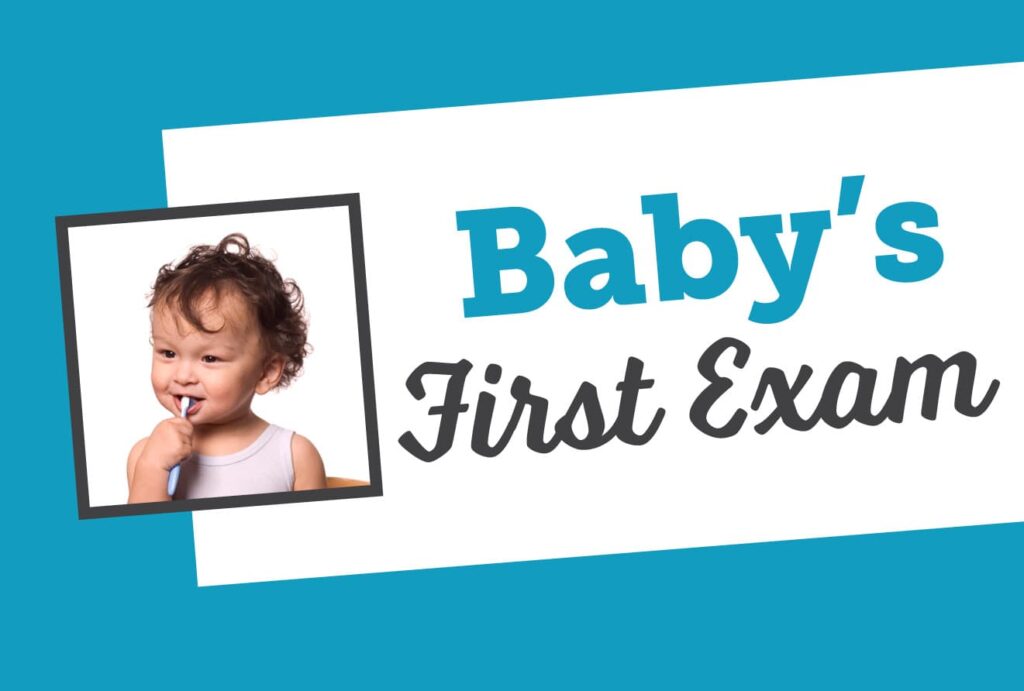
Trips to the dentist are an essential part of oral care, but for a child, the first time can be scary. Sitting in a chair, under a light, while a stranger pokes inside their mouth is understandably daunting.
We are often afraid of things we don’t understand, so the best way to make your child’s first trip to the dentist smooth sailing is to help them understand what to expect before they get to the office. Knowledge will make the visit more comfortable and relaxing.
Normalize visits to the dentist with books, or simply talking about it! There are many children’s books out there that help make a visit to the dentist easier! A list of books can be found here. Dr. Jennison even wrote a children's book, A Sugarbug's Delight.
We also recommend roleplaying with a pretend visit! Making the dentist fun at home will make the outing more fun when the time comes. Be sure to use positive vocabulary, avoiding words like shot and hurt. Instead, talk about a clean, strong smile. In keeping with the positive theme, be sure not to bribe your kids with a post-appointment treat. Bribery gives the idea that there is something to be nervous about. Instead, opt for surprising them with some sort of reward after the fact.
Here at our practice, because we specialize in pediatric dentistry, we too have tactics to make the appointment go easy and smooth for both you and your child! Some children are ready to sit in the dental chair at their first appointment. Others do better in a knee to knee position, where they lay on a board between a parent and the doctor. Tell your child that the team will count and shine their teeth. Thank you for trusting us to take care of your child in a specialized way.
So when should you schedule this trip? As a rule of thumb, kids should start going to the dentist by age 1 or within six months after their first tooth erupts. We’ll see you then!
Tags: Dental Care, Baby Teeth, Oral Care, Cavity Prevention, Oral Health, Early Infant Oral Care, Infant Oral Care, Pediatric Dentist, Healthy Teeth, Childrens Teeth, Kids Teeth
Posted in Uncategorized, Cavity Prevention, Oral Care, Infant Oral Care, Dental Care, Oral Health, Preventing Cavities, Baby Teeth, Preventative Care, Good Dental Habits, Dental Health, Pediatric Dentist, Oral Care for Kids, Oral Health Care, Healthy Mouths, Healthy Kids, Childrens Teeth | No Comments
March 28th, 2019
Baby teeth aren’t permanent, but did you know that it’s possible to loose a baby tooth too soon? Here’s everything parents need to know about losing a baby tooth too soon.
It's too Soon When...
If your child loses a tooth before the age of 4, then you need to schedule an appointment with your pediatric dentist. Usually, natural tooth loss begins around age 6, and concludes around age 12.
Risks of Losing Teeth too Soon
If a baby tooth is lost too early, it can cause serious crowding problems for the developing adult teeth, as well as negatively impact the jaw’s muscle and bone development. This can lead to necessary orthodontic treatment later in life to correct a bite and alignment issues.
Common Causes of Tooth Loss
The most common causes of premature tooth loss are traumatic facial injuries and tooth decay. It’s impossible to prevent accidents from happening, but you can prevent tooth decay by ensuring your child follows a healthy brushing and flossing regiment, and enjoys mouth healthy foods and plenty of water.
When is it Okay to Lose a Baby Tooth?
Baby teeth usually begin to fall out around age 6, and the process usually lasts 6 years until ages 11-12. Baby teeth will naturally become looser, and fall out on their own to make room for adult teeth erupting beneath them. Usually, teeth fall out in the order that they first arrived, but that’s not always the case.
Can You fix a Tooth lost Too Early?
Fortunately, there are plenty of options for those that lose teeth too soon! Spacers and space maintainers are placed in the gap of the lost tooth to help prepare for the arrival of the incoming adult tooth. Spacers come in many shapes, sizes and colors, and can make an un-fun situation more enjoyable for your child.
Schedule an Appointment with Our Office
If you think that your child has lost a tooth too soon, then call our office to schedule an evaluation. We’ll provide your child with the necessary treatment that best prepares their mouth for a healthy, adult smile.
September 13th, 2018
Baby teeth play an important role in helping children develop healthy smiles that grow with them. Here’s five important facts about baby teeth that parents need to know to help their children keep their baby teeth healthy and strong.
1 – Baby Tooth Enamel is Hard, but Vulnerable
Tooth enamel is the hardest substance in the human body, yet it is always under constant attack by sugar, acid and external forces. You can help keep your child’s tooth enamel strong by giving them more water, which helps rinse teeth clean of harmful bacteria and acids. Additionally, limit sugar and sugary beverages in their diet to help give their enamel a break. Make sure to brush twice a day for two minutes and floss at least once a day.
2 - Baby Teeth help Set up a Healthy Bite
Baby teeth play a critical role in developing a healthy and aligned adolescent and adult bite. If a baby tooth is lost too soon, it can lead to teeth crowding the vacant spot, which can cause bite alignment problems.
3 - Baby Teeth Need Proper Nutrition
The proper diet can go a long way in helping your child maintain a health smile. When shopping for food, try to add more fruits and vegetables that are rich in nutrients and fiber. High fiber foods scrub teeth and keep them clean of food debris and damaging sugar, which can lead to tooth decay and cavities. Adding more magnesium and calcium to your child’s diet can strengthen their tooth enamel, and help prevent cavities.
4 - Baby Teeth CAN be Lost Too Early
Usually, natural tooth loss begins around age 6, and concludes around age 12. If your child loses a tooth before then, schedule a visit with our office so that we can take the appropriate actions for the health of their smile.
Does Your Family have a Dental Home?
The American Academy of Pediatric Dentistry recommends that you establish a dental home for your children by their first birthday. This helps you get a dental health plan that works for their smile, and helps them get more comfortable with oral healthcare at an early age.
January 11th, 2018
Being a new parent is a HUGE challenge filled with thousands of questions and a lot of research. We’re here to help new parents get their children a healthy smile with some of our favorite tooth tips for new teeth!
Begin an Oral Health Care Routine

Question: do you have to clean baby’s mouth if it has no teeth? Answer: YES! A baby’s first tooth doesn’t typically erupt until they are 8 months old, but it’s still important to keep their mouth clean. You can clean their gums by taking a damp cloth or gauze and gently rubbing it over their gums to remove any food debris. You may choose to use a very soft, baby toothbrush and lightly brush their gums using a very low amount of pressure to avoid upsetting their sensitive gums. However, a damp cloth works just as well.
Establish a Dental Home
The American Academy of Pediatric Dentistry advises parents to establish a dental home for their children before their first birthday. Usually, a child’s first tooth will appear between 6 and 10 months of age, which makes it the perfect time to choose a comfortable dental home for your child.
By choosing a pediatric dental home for your child, you get them the best oral care specifically designed for young teeth. A pediatric dentist will be able to diagnose any issues in your child’s smile, and provide you with the knowledge needed to help them achieve oral health success.
Incorporate Mouth Healthy Foods
Around ages 4- 6 months, most children are ready to begin eating some solid foods. You can take this opportunity to introduce them to some mouth-healthy foods that their body and developing smile will appreciate. Soft foods like bananas, cooked sweet potatoes and avocado are fantastic healthy foods for children beginning a solid diet. Sweet potatoes are high in Vitamin-A, and support healthy teeth and gums, and avocados contain high amounts of Vitamin C, which contains folate – a mineral that combats gum disease.
Be Flexible
Your child’s mouth is going to evolve, and their oral health routine will need to adapt to fit their smile. As they age, be sure to replace their toothbrush when the bristles begin to plume and fray, and pick one with soft bristles that they can easily grab. Also, be sure to visit the pediatric dentist twice per year so that you can stay up-to-date on any changes in their smile that need to be treated.
Visit Our Office Regularly
Providing the best dental care for your child is our top priority, and we would love to speak with you about your child and their dental needs. Establishing a dental home early is very important, so we suggest that you bring your toddler in right after their first tooth emerges. That way, we can craft a dental plan that will help them earn a healthy smile that lasts for life. We see children of all ages, so call us and schedule an office tour! We want to make visiting the dentist fun, and easy for your child. Call us today to schedule an appointment, or a relaxing meet-and-greet.
September 15th, 2016

It’s never too early to begin a healthy oral care routine. In fact, you should begin caring for your child’s gums long before their first tooth emerges, which is usually around the six-month mark of their life. Healthy gums are an important predicator of healthy teeth, and maintaining clean gums will help ensure that your child has healthy, cavity-free baby teeth. But how can you keep your infant’s mouth clean? Below are some tips that will you keep your new child’s mouth clean, and set them up for a healthy smile later in life.
Avoid Baby Bottle Tooth Decay
Baby bottle tooth decay is one of the most common ailments that young children encounter. It usually occurs when infants drink milk or other sugary beverages in their bottle without cleaning their mouths afterwards. You can avoid baby bottle tooth decay by giving your child water after they’ve had milk, and by limiting or eliminating sugary beverages in their bottles. If your child requires a bedtime bottle, then make sure that it is filled with only water so that you’re not exposing their teeth to sugar for long periods.
Use a Washcloth
You can clean your infant’s gums – or their first teeth – by simply using a cold, clean wash cloth. Simply rinse a clean, soft wash cloth with cool water and wring it out. After your child has finished eating, or drinking a sugary drink, use the damp wash cloth to gently wipe out their mouth. This will remove any sugar or acid that’s left by their food, and help prevent early cavities.
Find the Right toothbrush
Once your child has a few more baby teeth – usually between 8 and 12 months – then you can graduate from a wash cloth to a toothbrush designed for toddlers. There are a lot of toothbrushes designed for babies and toddlers from which to choose. Generally speaking, toothbrushes designed for babies have much softer bristles and a smaller head than those meant for older children.
After finding the right toothbrush, begin brushing your child’s teeth and gums twice per day. Make sure to be extra gentle, since their teeth and gums are still developing and are quite sensitive. Use toothpaste with fluoride that is made for very young children, and not as spicy as adult’s toothpaste. Use only a smear of toothpaste – about the size of a grain of rice – to bruish their teeth. When they’ve gotten older and have more teeth, use a pea-sized amount of toothpaste. Always be sure to rinse their mouth out with cool water after you’re done brushing, and try to keep them from swallowing any toothpaste.
Visit Our Office
If you’ve just had a baby, and are unsure about how to properly care for their mouth, then visit our office. The American Association of Pediatric Dentists advises new parents that their child should establish a dental home by their first birthday. By doing so, you can help your child avoid cavities, and become more comfortable visiting the dentist as they age. Our office is designed to cater to children, and create a relaxing and unintimidating atmosphere which they look forward to visiting.
March 31st, 2016

When we think of healthy alternatives to soda and other sugary drinks, its often common to look to fruit juice as a healthy alternative. Generally high in essential vitamins, fruit juice can be a much better choice than other beverages. Unfortunately, it can also be one of the worst offenders. The sugars and citric acid found in most fruit juices cause double trouble for teeth, and can lead to tooth decay at an early age.
A lot more sugar than you think.
Apple juice can contain as much as 10 tsp. of sugar. That’s exactly the same amount as found in the leading cola. Grape juice contains even more, with nearly 15tsp. Further, the citric acid in fruit juice can be tough on enamel, eating away at the first line of defense for healthy teeth.
Moderation...and water.
Consuming fruit juice isn’t in and of itself bad. Instead, the real problem is that we often simply consume too much juice or that we don’t rinse or brush afterwards. Children are especially at risk when juice is given too frequently. The American Academy of Pediatric Dentistry recommends that children have no more than 6 to 8 ounces of citrus fruit juice per day. Also, it’s important to limit your children’s consumption of juice to once a day, preferably with a meal, instead of spread out through the day, such as in a sippy cup. For the juice-lover in the family, two servings of watered down juice is a great way to satisfy a craving!
July 30th, 2015

One of the many milestones that parents anticipate as their children grow up is the loss of baby (primary) teeth. It’s an exciting part of the transition from baby and toddler to becoming a “big kid”. We’re often asked questions about what to expect. While every child is different and no child follows an exact schedule, we’ve provided a few general guidelines:
What timeline can be expected?
Most children will have all of their 20 primary teeth around the age of 3. Some of these primary teeth stick around until your child becomes a teenager. Although they will eventually fall out, it is very important that you and your child takes care of their primary teeth to prevent cavities, decay and gum disease. Caring for primary teeth now will set the stage for healthy adult teeth when they are ready to grow in.
On average, the first tooth falls out when children are 6 years old and will usually fall out in the order they came in. Around this time children will also begin to receive their first permanent molars at the back of their mouth where there is already a space waiting for them. Around the age of 8, you can generally expect the bottom 4 primary teeth (lower central and lateral incisors) and the top 4 primary teeth (upper central and lateral incisors) to be gone and permanent teeth to have taken their place.
After these major changes, many parents experience about a one-two year break when their wallet can take a breather from dishing out tooth fairy cash. By approximately 13 years old, the rest of your child’s primary teeth (canine/cuspid, first premolar, and second premolar) should have fallen out and the second (12 year old) molars will start to erupt. The third molars (wisdom teeth) will come in around 17-21 and these are the last set of teeth to grow in.
Is special care needed?
When your child is starting to lose his or her teeth, they will want to wiggle and play with it. This is normal and encouraged. The tooth will eventually fall out on its own. However, you should instruct your child to not yank or put unnatural force on the tooth if it’s not quite ready to come out. This can damage roots, harm sensitive gum tissue and even cause infection. Losing a tooth is usually never painful.
What if my child is late in losing her teeth?
Certainly, the exact age of losing teeth differs for every child. It is to be expected that if your child received their baby teeth early and quickly, the same will happen for when they start to fall out and vice versa. Again, all children are different and there is no need to be alarmed as long as their teeth are falling in the right order. If you do have some concern, please do not hesitate to give us a call.
July 16th, 2015

There are a lot of myths and misconceptions about a child’s first teeth. Primary teeth, also called milk teeth or baby teeth, are the temporary teeth that end up under pillows and provide plenty of business for the tooth fairy! Here are four myths about baby teeth that every parent should know:
#1 Baby teeth aren’t important.
Many parents mistakenly believe that baby teeth are less important than permanent teeth because they are just going to “fall out anyway”. But baby teeth serve a very important purpose as place-holders in growing mouths during early years of development. They help maintain the proper structure of the mouth in providing a guide for permanent teeth to move in behind them when the time comes. A baby tooth lost too early can lead to crowding of adult teeth, for example.
#2 Cavities in baby teeth do not matter.
This one is similar to dismissing the importance of a baby tooth because it’s based on the idea that since these teeth will eventually come out, what happens to them beforehand doesn’t matter. Unfortunately, cavities cause more than just a cosmetic blemish. Cavities can cause pain or discomfort for children and even abscess if left untreated. Further, cavities harbor bacteria that can spread through the bloodstream and effect your child’s overall health.
#3 There’s no need to brush baby teeth.
Parents should begin brushing teeth as soon as they appear. Not only will this help prevent tooth decay, but it also begins a lifetime of good dental habits. It’s even a good idea to begin oral care before teeth appear. A soft, damp rag rubbed over your baby’s gums reduces bacteria and helps emerging teeth get off to a great start.
#4 Kids don’t need to see a dentist until they are older.
Unfortunately, many parents don’t take their child to the dentist until there is a problem. The American Academy of Pediatric Dentistry (AAPD) suggests that parents bring their children for a first dental visit as soon as the first tooth emerges or by age one at the latest. Establishing a “Dental Home” early will ensure that your child has a good experience on their first visit and develops a trusting relationship with the dentist.
Do you have questions about your baby’s teeth? Don’t hesitate to ask! We would love to talk to you about any questions or concerns you might have!
January 29th, 2015
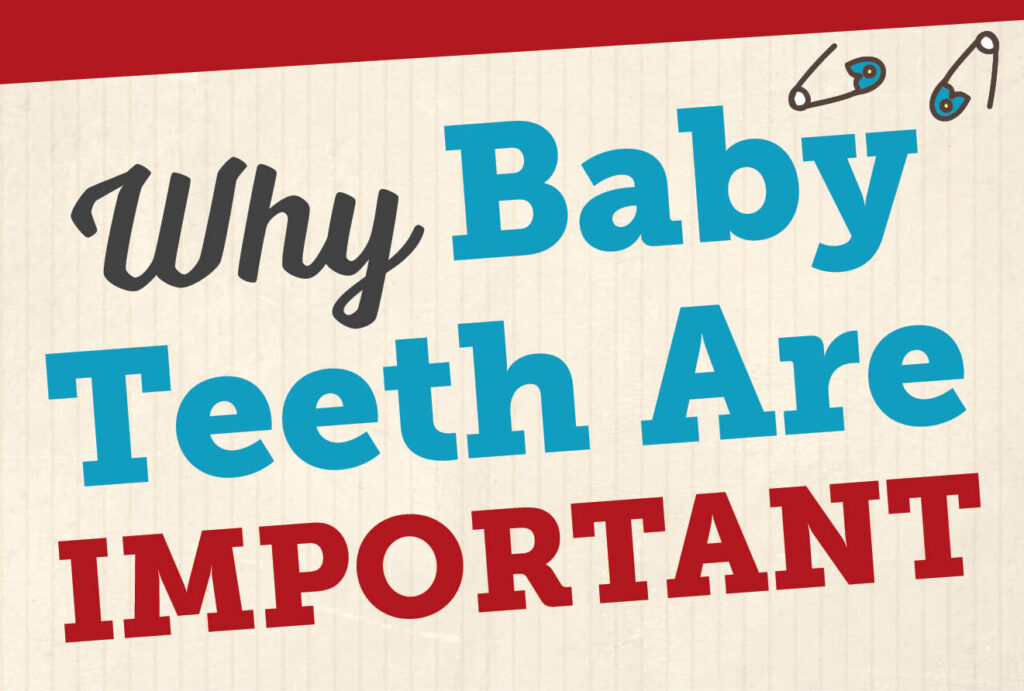
We often hear people downplay the importance of primary teeth (also called “baby” or “milk” teeth). The front 4 primary teeth generally last until 6-7 years of age, while the back teeth (cuspids and molars) aren’t replaced until age 10-13. People mistakenly believe that since these teeth are temporary, that they do not matter in the long run. This will often lead to the neglect of primary teeth and can cause permanent damage.
In truth, it is very important to care for the health of the primary teeth. Untreated cavities frequently lead to problems which have long term effects on developing permanent teeth. Here are four reasons why caring for primary teeth is so important:
(1) Proper chewing and eating. A cavity free mouth often means that it’s easier to enjoy healthy foods without pain or discomfort. It also means that children are more likely to chew their food completely and are less likely to develop bad eating habits.
(2) Providing space for the permanent teeth. Primary teeth reserve space for the permanent teeth. They help in guiding primary teeth into the correct position.
(3) Permitting normal development of the jaw bones and muscles. Like any muscle, your baby’s face and jaw muscles need exercise to help them develop; healthy primary teeth allow for proper chewing to build these muscles. Without well-developed jaw muscles, your baby’s jawbones may not develop properly.
(4) Proper development of speech. Missing teeth can affect the ability for a child to form words and learn to speak properly. These speech problems can translate into difficulty later in life.
Aside from the reasons listed, there is a very practical reason for taking care of primary teeth: healthy smiles add to an overall attractive appearance which encourages a positive self esteem and good self image.
August 19th, 2013

There are a lot of myths and misconceptions about a child's first teeth. Primary teeth, also called milk teeth or baby teeth, are the temporary teeth that end up under pillows and provide plenty of business for the tooth fairy! Here are four myths about baby teeth that every parent should know:
#1 Baby teeth aren’t important.
Many parents mistakenly believe that baby teeth are less important than permanent teeth because they are just going to “fall out anyway”. But baby teeth serve a very important purpose as place-holders in growing mouths during early years of development. They help maintain the proper structure of the mouth in providing a guide for permanent teeth to move in behind them when the time comes. A baby tooth lost too early can lead to crowding of adult teeth, for example.
#2 Cavities in baby teeth do not matter.
This one is similar to dismissing the importance of a baby tooth because it’s based on the idea that since these teeth will eventually come out, what happens to them beforehand doesn’t matter. Unfortunately, cavities cause more than just a cosmetic blemish. Cavities can cause pain or discomfort for children and even abscess if left untreated. Further, cavities harbor bacteria that can spread through the bloodstream and effect your child’s overall health.
#3 There’s no need to brush baby teeth.
Parents should begin brushing teeth as soon as they appear. Not only will this help prevent tooth decay, but it also begins a lifetime of good dental habits. It’s even a good idea to begin oral care before teeth appear. A soft, damp rag rubbed over your baby’s gums reduces bacteria and helps emerging teeth get off to a great start.
#4 Kids don’t need to see a dentist until they are older.
Unfortunately, many parents don’t take their child to the dentist until there is a problem. The American Academy of Pediatric Dentistry (AAPD) suggests that parents bring their children for a first dental visit as soon as the first tooth emerges or by age one at the latest. Establishing a “Dental Home” early will ensure that your child has a good experience on their first visit and develops a trusting relationship with the dentist.
Do you have questions about your baby’s teeth? Don’t hesitate to ask! We would love to talk to you about any questions or concerns you might have!
January 31st, 2013

The CDC reports that tooth decay is the most common disease in children. More than 40% of children have cavities by the time they reach kindergarten. While the cavity rate in children of older age groups has been slowly declining, the rise in cavities among those under 5 is actually increasing. Unfortunately parents often wait too long to begin caring for emerging teeth. Union Pediatric Dentistry helps educate parents on how to care for their children's teeth and build dental hygiene habits for a lifetime of good dental health. Here are six essential tips to get you started on the right path:
- Toothpaste isn’t really needed before teeth emerge, but a soft wet washcloth gently wiped over gums twice a day is a great way to keep bacteria at bay and keep the gums healthy.
- Make oral care a part of a daily routine. Getting into the habit early will increase the likely-hood that you (and eventually your child) will keep up this healthy practice once teeth appear.
- When the first teeth start to show up (usually around 6 months, but this can vary greatly from child to child), use a toothbrush specifically designed for babies. These brushes have smaller heads for smaller mouths and very soft bristles to avoid damaging sensitive gums.
- Use only a pea sized amount of toothpaste. Young children have trouble not swallowing toothpaste, so keep the amount minimal and consider using fluoride free toothpaste until your child has learned not to swallow when brushing.
- Brush your child’s teeth until he or she is able to hold the brush.
- Be aware of the signs of baby tooth decay (spots or pits on teeth) and stay up to date on dental exams.












